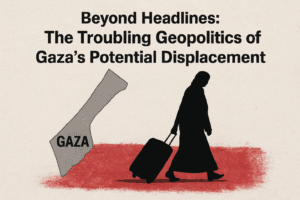Beyond Headlines: The Troubling Geopolitics of Gaza’s Potential Displacement
Israel is reportedly discussing plans with South Sudan to resettle Palestinians from Gaza, framing it as “voluntary migration.” This proposal faces fierce opposition as Palestinians, rights groups, and neighboring Egypt condemn it as forced displacement violating international law. South Sudan’s potential interest appears driven by desperation for allies and economic relief, seeking leverage with the US amid its own severe crises.
The bitter reality is that traumatized Gazans—enduring famine and bombardment—would be moved to another shattered landscape plagued by hunger, instability, and potential hostility rooted in South Sudan’s civil war history. Palestinians universally reject permanent exile, fearing Israel would exploit their absence to annex Gaza permanently. The plan prioritizes geopolitical maneuvering over human dignity, attempting to transfer profound suffering between two vulnerable populations rather than address root causes or ensure rights. This strategy sets a dangerous precedent for resolving conflicts through population removal.

Beyond Headlines: The Troubling Geopolitics of Gaza’s Potential Displacement
The Associated Press report revealing Israel’s discussions with South Sudan about resettling Palestinians from Gaza isn’t just another diplomatic leak. It exposes a deeply controversial strategy with profound human costs, unfolding against a backdrop of shattered lives and questionable legality. Here’s a deeper dive into the complex layers:
The Core Proposal & Its Framing:
- The Plan: Israel is exploring the feasibility of relocating Palestinians from Gaza to South Sudan, a nation itself ravaged by recent civil war and facing severe humanitarian challenges.
- The Justification: Prime Minister Netanyahu frames this as “voluntary migration,” invoking Donald Trump’s past suggestions. He argues it aligns with “the laws of war” to allow civilians to leave conflict zones. Israel is reportedly pursuing similar talks with other fragile African states (Sudan, Somalia, Somaliland).
- The Reality Check: “Voluntary” is fiercely contested. Palestinians, human rights organizations, and much of the international community view this as a blueprint for forcible displacement, violating the Fourth Geneva Convention which prohibits the deportation or forcible transfer of protected persons from occupied territory.
Why South Sudan? The Geopolitical Calculus:
- Desperation for Allies: South Sudan, independent since 2011, is cash-strapped, heavily aid-dependent, and diplomatically isolated. Building ties with a powerful regional actor like Israel offers potential economic and political benefits.
- Leverage with the US: South Sudan reportedly seeks relief from US sanctions and a travel ban. Accepting deportees (as it has done recently) and potentially hosting Palestinians could be seen as bargaining chips to curry favor with the Trump administration.
- Historical Ties: Israel’s Mossad reportedly aided South Sudanese rebels during their long independence struggle against Sudan’s Arab-dominated government, creating a historical connection.
Overwhelming Opposition & Denials:
- Palestinians: Vehemently reject permanent resettlement, viewing Gaza as an inseparable part of their homeland. Fear is rampant that leaving, even “temporarily,” means permanent exile, enabling Israeli annexation and settlement re-establishment.
- South Sudanese Civil Society: Edmund Yakani warns against becoming a “dumping ground,” highlighting potential hostility due to South Sudan’s own painful history with Arab Muslims from the north.
- Egypt: Strongly opposes any transfer of Palestinians out of Gaza, fearing destabilization and refugee influx. Egyptian officials confirm lobbying South Sudan against the deal.
- Official Denials: South Sudan’s Foreign Ministry called the reports “baseless.” Israel’s Deputy FM stated she wouldn’t discuss it during her visit, though sources claim talks are ongoing.
The Stark Human Cost: From One Crisis to Another The proposal asks traumatized Gazans, enduring war, famine, and the destruction of their homes, to consider moving to a country:
- Also in Crisis: Emerging from a brutal civil war that killed nearly 400,000 and caused famine. Fragile peace holds, but instability persists.
- Facing Severe Hunger: Reliant on international aid (now reduced) to feed its population.
- Plagued by Instability & Corruption: Ranked among the world’s most fragile states.
- Potentially Hostile: The legacy of South Sudan’s war against the Arab Muslim north could create dangerous tensions for arriving Palestinians.
The Unanswered Questions & Concerns:
- True Voluntariness: How would “voluntary” be guaranteed under the immense pressure of Gaza’s devastation? What alternatives would Palestinians have?
- Right of Return: Would Palestinians be guaranteed the unequivocal right to return to Gaza? History suggests deep skepticism.
- International Law: Does mass relocation, even if framed as voluntary, circumvent the prohibition on forcible transfer from occupied territory?
- Exploitation: Is this leveraging the desperation of two vulnerable populations (Gazans and South Sudanese) for geopolitical gain?
- Sustainability: How would makeshift camps in a struggling nation provide a viable, dignified future?
The Bigger Picture: This isn’t an isolated incident. It’s part of a pattern where powerful states seek solutions to complex conflicts by moving vulnerable populations, often to equally vulnerable regions, raising serious ethical and legal red flags. It prioritizes geopolitical maneuvering over addressing the root causes of displacement and upholding fundamental human rights.
Conclusion: A Dangerous Precedent? The reported Israel-South Sudan talks represent more than a potential refugee deal. They signify a deeply troubling approach to resolving the Gaza conflict – one that risks permanently displacing a population under the guise of voluntariness, potentially violating international law, and transferring human suffering from one fragile context to another. The overwhelming rejection by Palestinians and concerns from civil society and neighboring states underscore the profound moral and practical flaws in this strategy. The path forward must prioritize a ceasefire, massive humanitarian aid, rebuilding Gaza, and a genuine political solution ensuring Palestinian rights and security within their homeland, not schemes for their removal.
You must be logged in to post a comment.